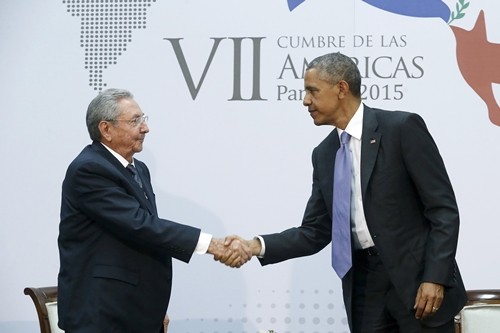(VOVworld) – US and Cuba are moving toward a full resumption of diplomatic ties, which have been suspended since 1961. Like the historic handshake between US President Barack Obama and Cuban President Raul Castro at the funeral of South African President Nelson Mandela in December, 2013, the current meeting between the two leaders at the Summit of the Americas in Panama is seen as a significant landmark, signaling a new chapter in bilateral ties.
 |
Cuban President Raul Castro and US President Barack Obama met at the 7th Summit of the Americas on April 11, 2015 (Reuters)
|
In front of UN Secretary General Ban Ki Moon and Latin American leaders, the US and Cuban Presidents shook hands and had a short conversation prior to the opening of the 7th Summit of the Americas (OAS) on April 11, the first official encounter between the top leaders of the two countries since 1956.
The historic meeting
Prior to the summit the US and Cuba indicated they are ready to discuss all pending issues in a spirit of patient, friendly, respect for their differences. In a telephone conversation before coming to Panama, Castro told Obama he is willing to talk about controversial matters like human rights and press freedom. Obama said a new chapter in American-Cuban relations has begun and today America chooses to loose the shackles of the past. Acknowledging that it will take time to normalize economic and diplomatic relations, the leaders stressed the importance of resuming diplomatic ties for mutual benefit. Obama said there are obvious differences between countries, even between allies.
The international community has enthusiastically welcomed warmer relations between the American and Cuban leader. UN Secretary General Ban Ki Moon said the attendance at the summit of President Raul Castro of Cuba after 26 years of Cuban absence has been much awaited by many in the region. Venezuelan President Nicolas Maduro said described the Cuban President’s attendance as the biggest achievement of the Latin America and the Caribbean. Colombian President Juan Manuel Santos praised efforts to improve US-Cuban relations as healing an old blister that has hurt the Americas for years.
More time is needed to normalize diplomatic relations
Since the decision was made to thaw relations with Cuba last year, the US has removed a number of restrictions. Limitations have been eased on Americans traveling to Cuba, using credit cards in Cuba, and purchasing special taxed commodities from Cuba such as cigarettes and alcohol worth more than 100 USD.
Trade and telecommunications activities have been expanded. In February the two countries signed an agreement to establish direct telephone service. In March the US Department of Finance removed sanctions on 60 companies and individuals doing business with Cuba. US companies are now allowed to invest in Cuba’s private sector. The two countries will soon reopen their embassies.
The biggest obstacle to normalizing relations is the US’s designation of Cuba as a State Sponsor of Terrorism since 1982. President Obama agrees with the US State Department’s recommendation to remove Cuba from the list, but the decision is up to the Congress. Obama will have to wait 45 more days for Congress’s decision. Analysts say Obama has support for improving ties with Cuba because the US will be the biggest beneficiary of normalized relations with Cuba.